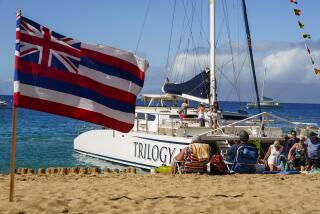Bali Tourism Imperiled by Ecological Damage
- Share via
BALI, Indonesia — Deadly nightclub bombings in 2002 nearly wrecked Bali’s vital tourism industry.
Now dirty beaches, stinking rivers and food-borne illnesses are putting off visitors and threatening the tropical island’s chances for a full recovery, environmental activists warn.
“What if I told you there was another bomb about to go off in Bali?” asked Norman van’tHoff, an Australian who runs an environmental group in Bali that is staffed and financed by the thousands of surfers who flock to its beaches each year.
Van’tHoff says it’s not terrorism, but rather the rapid deterioration of the island’s environment. “Air and water quality are both down the toilet in Bali,” he said.
Ninety percent of the island’s economy is based on tourism, and Bali suffered a severe blow when terrorist bombs exploded in a nightclub district the night of Oct. 12, 2002, killing 202 people, most of them foreign tourists.
The attack, which was blamed on an Al Qaeda-linked extremist group, Jemaah Islamiah, sparked travel warnings from such major overseas markets as the United States, Australia and Europe. Foreign tourist arrivals plunged 60%, and thousands of Balinese lost their jobs.
The U.S.-led war in Iraq and the SARS outbreak added to the island’s woes.
Bali has only just begun to show signs of recovery, but community groups fear that growing environmental degradation in the most populated areas may be a bigger long-term threat to the economy than the terrorist attacks.
To be sure, Bali remains one of the world’s premier tourist destinations and still boasts hundreds of miles of pristine beaches and lush tropical forests. But problems are evident.
In the main tourist area of Kuta, piles of rubbish lie on the beach and rank odors waft from drains that are sometimes clogged with raw sewage.
Twenty-five tourists from Taiwan -- a key market for Bali -- were hospitalized with dysentery after eating at a Chinese restaurant in November.
“The dysentery outbreak among Taiwanese tourists is just a warning,” said Viebeke Lengkong, a member of a group that monitors Kuta’s development.
Activists warn that raw sewage often contaminates rivers, a problem exacerbated by runoff during the rainy season from October to May. They say there is no sewage plant to treat overflow from the island’s densely populated urban areas.
Dr. Andre Dita, who treats tourists at the island’s busiest hospital, Sanglah, says visitors’ most common complaint is diarrhea caused by contaminated water.
“In addition, surfers and swimmers who spend a long time in the ocean often get a fever because the water quality is so poor,” he said.
I Gede Pitana, director of the Bali Tourism Authority, says that, overall, the island is still beautiful. But he concedes that “there are pockets of Bali where environmental destruction is extremely bad. It’s shameful.”
He blames most problems on poor planning and poor law enforcement.
“There is no coordination among the district and the provincial governments,” he said. “Each district is competing separately to build hotels so they can tax them, regardless of the damage they may cause to the environment.”
Van’tHoff’s group, Gelombang Udara Segar, or A Wave of Fresh Air, has built public toilets and manages garbage collection programs at popular surfing beaches. It also works with hotels and garment-makers to reduce waste entering waterways.
The group has 16 staffers who work out of a tiny second-floor office 100 yards from the site of the nightclub bombings.
“Surfers started the tourism industry here. We have been benefiting from Bali for years and it is time we started putting something back,” said van’tHoff, who comes from Whitsunday Islands.
Bali has long been the jewel in Indonesia’s tourist crown.
Its first visitors were Western painters attracted by the island’s colorful Hindu culture, centuries of artistic traditions and relaxed lifestyle.
They were followed by surfers, who began appearing in the 1930s. An American surfer, Robert Koke, opened Bali’s first tourist resort in 1936.
After the bombings, foreign surfers were among the first tourists to return, disregarding travel warnings and wearing T-shirts declaring, “Osama don’t surf.”
More to Read
Sign up for The Wild
We’ll help you find the best places to hike, bike and run, as well as the perfect silent spots for meditation and yoga.
You may occasionally receive promotional content from the Los Angeles Times.






